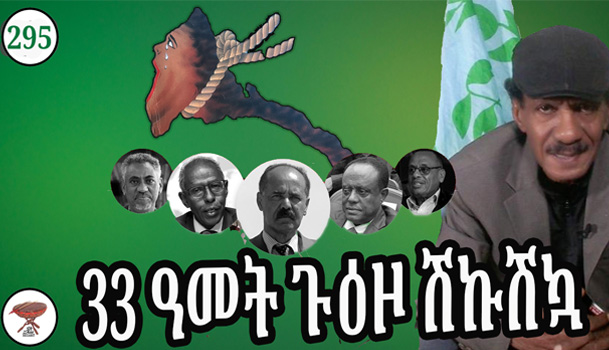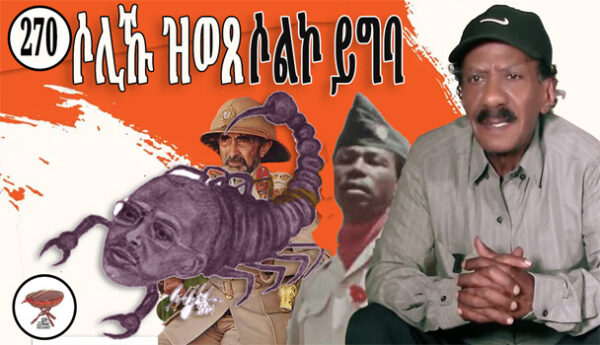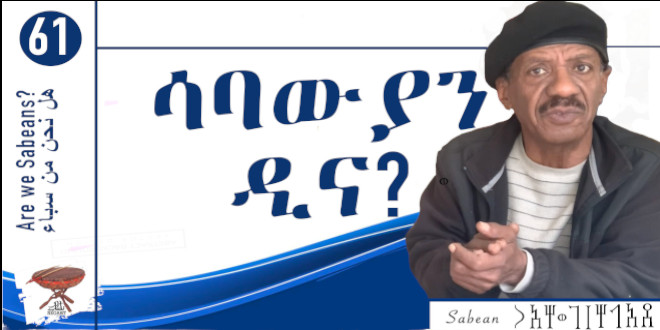33-years Of Sleepwalking Journey
Time is like a sword; if you don’t cut it, it cuts you. That’s an Arabic wisdom. Time goes by, and people complicate things, forget what needs to be done, and busy themselves with wasting their time and others’ time. But time has no favoritism; death is inevitable. Kbur Brezidenti, you are in your 80s, and you have crossed the Eritrean average life expectancy at birth. Its way overdue, and I think you must reflect on the damages so far inflicted on the nation despite the huge sacrifices that were paid in search of freedom and stability. It’s profound.
In the mid-sixties, this is how Brezidenti Isaias looked, and how I looked in the seventies. Anyone can try to see where they were and how they looked a decade earlier and see the difference. Time always does its job. Extrapolate these images on the rest of your generation, my generation, and the generation that follows. Maybe that will wake up the sleepwalkers. And yes, time is like a sword; if you don’t cut it, it cuts you.
When you joined the armed struggle in Kassala, I was a fourth grader. Starting from an early age, I diligently followed your controversial path and actions; since then, I am still following your news, particularly since you became the Brezidenti, for life, it seems. I never thought there would come a day when I would become one of your victims.
Today, under your rule, fear engulfs Eritrea, and exclusion has become the hallmark of your governance. I wonder, maybe you are not suffering from somnambulism! That’s the fancy name of the sleepwalking in a simpler language.
Sleepwalking disturbing: one wakes up from a deep sleep and walks unconsciously. I had experienced that as a child. Imagine that under a shoot-to-kill curfew enforced by Tor Serawit and Commandis!
I used to wake up from my deep sleep, open the door of the room, then the gate of the fence, and wander aimlessly in the streets. Once the late Saleh Fellati found me in the dark street sleepwalking and returned me back home. I walked towards Hillet Sudan, and my father was alert and found me wandering in the street. It was a terrible experience.
That’s when my parents put a lock on the other side of the door; I struggled to open it from the inside, and the noises would wake my parents, who would come and take me back to bed. Gradually, I stopped sleepwalking for reasons I don’t fathom.
Mr. Brezidenti, do you suffer from sleepwalking? Maybe you wonder towards Adi Sherfeto, or further to Shiketi and Seharti? I suspect you take most of your decisions while sleepwalking. I say that because the people are paying for your bad decisions. That led to deep contemplation while I relaxed and decided to share with you my conclusions in seven points.
- I have always believed in reconciliation because I consider it my primary goal in life. Reconciliation was a must from the beginning—and I don’t mean you reconciling with your rivals. A simple gesture would have helped in establishing a semblance of normalcy; it was vital for the wellbeing of Eritrea. In 1991, most Eritreans were intoxicated by independence and victory. But you were more intoxicated by partisanship and brazenly undermined the calls for reconciliation. Instead, you focused on tightening your grip on power that you pursued brilliantly. Kudos! I admit that’s an important quality of a leader. Had you initiated that noble goal of reconciliation when you were very popular, no one would have dared to challenge your power for many years, and the nation would have been in a better situation.
Sadly, you didn’t appreciate the overwhelming support you enjoyed from allies and foes alike. You lacked the wisdom and distanced the real and potential rivals and widened the social and political gap. Kbur Brezidenti, you recklessly squandered most of the goodwill.
- Your heavy-handed governance disappointed the many who decided to bury the hatchet; you were left only with loyal partisan affiliates who immediately displayed an ugly feeling of superiority that is chewing on the Eritrean social fabric like a plague. You acted like a feudal lord and demanded unconditional surrender from Bonafide patriots and leaders whom you ordered to come on their knees to be pardoned by you simply for having different views to yours. You should have accommodated political differences; even a limited freedom of association and self-expression would have done marvels for the nation. Eritreans should have enjoyed justice and rule of law, for which they paid dearly. But you chose to govern ruthlessly by edicts and proclamations.
- Since your regime was supposed to be transitional, citizens gave you unlimited benefit of the doubt, enough room to govern with little pressure. Even your shortcomings and drastic measures were excused. However, soon the transitional term lost its luster and became a never-ending nightmare. That is not so for your followers and beneficiaries who enjoy lording over the common citizen from the upper rungs of the citizenship ladder. You relegated so many to the bottom rungs of the ladder and you made opposition elements of them. You created a large vacuum between the two tiers where only the undecided, the wishy-washy, the opportunists, and those with checkered histories occupy. Was all that necessary? No. Rule of law and citizen duty would have protected the nation.
- As a leader, you failed to restrain yourself from uttering bad words that alienated so many. You took advantage of the weakest habit in the Eritrean culture: its obsession with loyalty to the powerful. Your iron grip on power and heavy-handed governance caused disarray among the people; the nation has been losing its youth alarmingly for the last three decades. Worse, all that coincided with the blossoming of social media that provided a fertile ground for vulgarity, indecency, and hate among citizens. You helped to establish that culture when you started badmouthing your opponents indiscriminately and unfairly. You even branded Eritreans who demonstrated against your rule as Lahasti Byati (plate lickers), including the late Seyoum Ogbamichael, Harestai, a Bonafide patriot and a senior leader of the liberation struggle; he was your schoolmate and co activist. You failed in spreading decent discourse; instead, you poisoned it. To this day, many Eritreans do not know how to differ with civility.
- It pains me to see Eritreans compare your governance with the governance of the occupation we removed from Eritrea! That was unthinkable, but now it has become so common due to the frustration of the people. Thirty-five years after independence, Eritreans have yet to feel safe for their rights, their wellbeing, their freedom, and their children.
Eritrea is in a chaotic neighborhood; add to that the Ethiopian Elite’s perpetual tendency to consider Eritrea an excuse for all their failures—you should have anticipated that. Your foreign relations policy remained abysmal when a little tact would have bolstered your diplomatic clout. You rarely tried peace, freedom, national unity, economic emancipation, and equality. For instance, I was hopeful of your dream that you repeatedly expressed. But that is not possible in a country where your government and your party monopolize all aspects of its life! You rule the country like a military barrack and consider the discipline of the army reflective of society. It’s not. For the most part, under your rule, fear disciplines the people.
- Eritrea lacks a common vision that all stakeholders share; the weak social and political orientation illustrates that. There is a lack of tolerance; an alarming number of refugees are feeling Eritrea; the quality of education of most of the youth reflects the bad quality of your education system. The school curriculum by which children are reared is so bad and partisan in nature. Political hacks who focus on loyalty, spreading partisan narrations designed it, and condemned all opposing perspectives. Curriculum is supposed to be the responsibility of honest academicians and scholars, not party hacks.
- An overwhelming number of Eritreans are excluded from the national affairs because they don’t fall in line with the proscribed vision of the ruling party. The constitution has become a mirage, and you declared it dead soon after you promised its implementation years ago. The state of the court system is abhorring—basic rule of law is alien to the Eritrean vocabulary. You even stopped the party formation law that many accepted and imprisoned many (including the Mahmoud Sheriffo, whom you had assigned as a commissioner to draft the law). You just wanted a scapegoat to discard the law—I feel you don’t like to open the political space. Do you?
Finally, I would like to end my two parts whispering to your ears, hoping you might consider some of it. Note: I am just repeating what many have said for years and are still saying. I am just one of the many.
Kbur Brezidenti, our nation is agonizing; it’s wounded and needs healing. You control its reigns and blinders, and you can shorten or elongate the sufferings, provided you change your ruling methods. Will you change for the sake of the nation to partially payback the owed dues that you refused to pay for so long? Will you allow this wronged nation to breathe a sigh of relief and join the living instead of being overwhelmed sleepwalkers, destitution? Would you stop compartmentalizing citizens who, embarrassingly, are categorized as your individual loyalists and opposers? The struggle was waged based on the principles of justice, rule of law, and peaceful coexistence. Didn’t Eritreans struggle to establish a nation that can accommodate all its children, a nation where justice reigns, where peace and tranquility blossom?




Awate Forum